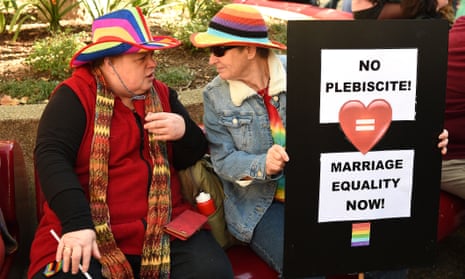For months now senior government figures have said a plebiscite on same-sex marriage is the people’s preferred way to achieve the social reform.
After Wednesday, that argument will be harder to make because a Newspoll found 48% of Australians want parliament to vote on the issue, while just 39% want a plebiscite, and 13% are undecided.
In June Malcolm Turnbull said there was “overwhelming support in the community” for a plebiscite. A poll on the eve of the election appeared to bear that out, with 69% support for the plebiscite.
Support fell below 50% in a Galaxy poll later in July. An Essential poll in September showed that 53% of Australians wanted a free vote in parliament if a plebiscite were blocked.
These numbers tell a story. First, that there is a discernible trend in polling against a plebiscite.
In the past few months the Greens, then the Nick Xenophon Team and Derryn Hinch indicated they would block the plebiscite. They will soon be joined by Labor. They cite a litany of complaints including its cost, and the departure from the ordinary functioning of representative democracy, and the effect on vulnerable LGBTI people.
A group of marriage equality advocates and LGBTI organisations – even the Qantas chief executive, Alan Joyce – have come out against the plebiscite; the government’s plan for $15m in public funding for the yes and no cases exacerbated their concerns.
The second point is that the poll results are consistent with people wanting same-sex marriage legalised regardless of how this is achieved.
Before the election, the government’s policy was not to allow a free vote but to hold a plebiscite. While many LGBTI people disagreed with a plebiscite, the majority of respondents to these polls would be heterosexual voters who support same-sex marriage. They were prepared to accept that a plebiscite was what was needed to get it done.
After the election, the government still says it needs to be achieved through a plebiscite, but the bloc opposed to the plebiscite is now sufficient to prevent the straw poll going ahead.
As soon as that reality sank in, a parliamentary vote overtook the plebiscite as the preferred option. It’s as if voters are shouting at politicians: “Get it done!”
What we don’t know is how voters will react if Labor blocks the plebiscite but the government refuses a parliamentary vote. Who will they blame?
It is possible that support will swing back in favour of a plebiscite and pressure will mount on Labor to let it happen. Or the Turnbull government may cop the blame because, after all, it’s in charge.
Labor can point to how quickly a parliamentary vote could be held and is essentially correct that the impediments are political – it is not Coalition policy, conservatives will not allow a free vote, it would be difficult for Turnbull to steer it through the party room.
The Coalition can accuse Labor of playing cynical politics with gay people’s lives, but the opposition of marriage equality advocates and LGBTI groups to a plebiscite gives the opposition cover to claim the purest of motives.
When Turnbull was communications minister and opposed a plebiscite, he noted that the lack of a conscience vote on same-sex marriage meant the issue would drag on unresolved. That observation has proved prophetic.
Some, such as the Monthly’s politics editor, Sean Kelly, argue persuasively that it should be the opinion of LGBTI people that determines the fate of the plebiscite because only they are personally affected by legalisation of same-sex marriage.
The attorney general, George Brandis, argues that marriage is an institution in which everybody has a stake and everybody should have a say.
But if politicians are concerned about what the Australian people as a whole think, the answer appears to be: legalise same-sex marriage by whatever mechanism possible.

Comments (…)
Sign in or create your Guardian account to join the discussion